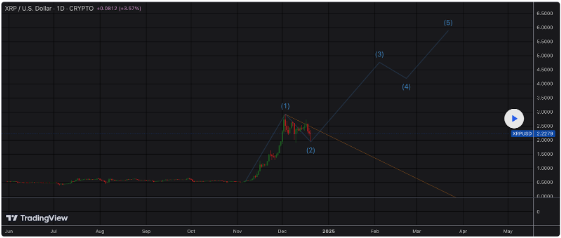The Biden executive order of March 2022 gave a clear signal that increased scrutiny and regulation were on their way. However, the order offered no clarity regarding which federal regulator would be tasked with the job. The crypto industry should not be in the crosshairs of a turf war between government agencies.
The market requires a principles-based regulatory approach to crypto assets and should not be facing a “shoot first, ask later” regulatory stance. Unfortunately, with Coinbase and Kraken both served with Wells notices recently, this seems to be the stance in the United States.
Would the industry be governed by an enforcer — a judge, jury and executioner? Or perhaps an agency inclined toward clearly defined guardrails, developing principles and guidelines that encourage and nurture innovation in a relatively nascent and at times fragile industry?
Two U.S. regulatory agencies see crypto assets, be it in a centralized finance or decentralized finance context, as their exclusive territories: the Securities and Exchange Commission, and the Commodity Futures Trading Commission. Not surprisingly, the SEC seems to regard most cryptocurrencies other than Bitcoin as “securities” while the CFTC has taken the opposing view.
One year after Biden’s executive order, there remains little clarity on the matter and no obvious strategy in place — a situation that is detrimental to all concerned. Regulatory battlelines have been drawn. Let’s consider the relative merits and legitimacy of each, and the idea that perhaps neither is the best way forward.
The crypto industry is still in development. There are signs that major players both in the CeFi and DeFi spaces are pivoting to jurisdictions such as Dubai and Hong Kong, which provide a clearer and more consistent principles-based regulatory approach than the U.S. style of regulations by enforcement.
SEC and crypto as a security
Back in 2018, then-SEC Chair Jay Clayton had this to say: “Cryptocurrencies: These are replacements for sovereign currencies, replace the dollar, the euro, the yen with bitcoin. That type of currency is not a security.”
By 2021 SEC Chair Gary Gensler had made a completely opposite statement “It doesn’t matter whether it’s a stock token, a stable value token backed by securities, or any other virtual product that provides synthetic exposure to underlying securities. These products are subject to the securities laws and must work within our securities regime.”
It’s critical to provide clarity. Regulations should not change at the whim of whoever holds the chair at the SEC.
The current understanding is that the SEC defines securities to include “investment contracts.” The SEC’s conclusion that digital assets are securities is based on the application of the Howey Test, which comes from a 1946 Supreme Court case involving a dispute over citrus groves. The Howey test can be defined as an “investment contract” that exists where (i) there is the investment of money, (ii) in a common enterprise, (iii) with a reasonable expectation of profits to be derived (iv) from the efforts of others.
It’s interesting to note that the SEC is focused very much on the “nature” of the transaction, with zero consideration for the fundamentals of the asset class items being sold (whether citrus groves or financial assets). But let’s get this right. Is a ruling from 1946 involving orange groves truly instructive or appropriate when the future governance of global financial markets hangs in the balance?
We are of the view that rule-making and legislation are better tools to define our laws for our industry than enforcement action.
Even the judiciary is skeptical of this enforcement route. The U.S. Federal Bankruptcy Judge Michael Wiles in the recent Voyager bankruptcy case stated: “Regulators themselves cannot seem to agree as to whether cryptocurrencies are commodities that may be subject to regulation by the CFTC, or whether they are securities subject to securities laws, or neither, or even on what criteria should be applied in making that decision. This uncertainty has persisted despite the fact that cryptocurrencies have been around for a number of years.”
Arguments against crypto as a security
Consider the impact of full-bore regulatory oversight by the SEC. Firstly, cryptocurrency exchanges would have to register with the SEC and comply with all applicable rules and regulations. In the example of ETH, crypto financial services companies offering ETH would have to register as broker-dealers in each jurisdiction where they operate. Regional differences would add significant obstacles for many operators and exchanges.
Although these changes could be implemented with time, they would radically alter the nature of crypto in terms of fast, frictionless transactions, the foundational advantages that have helped grow and popularize the DeFi market to date.
Ambiguously drafted or interpreted rules and regulations would almost certainly stifle innovation, a key characteristic of the DeFi industry. Would new DeFi products and services be subjected to lengthy federal approval processes? How would this impact the position of the U.S. as a global financial leader, especially if the European Union develops a more nimble regulatory and compliance framework?
Then there’s the inherently disparate and diverse nature of the DeFi industry. Many DeFi companies are idiosyncratic in nature, offering clients a menagerie of nuanced services and products. Does it really make sense to describe this diverse array of products and services simply as “securities”?
CFTC and crypto as a commodity
On the other side of the room, we have the CFTC, the federal regulatory authority for commodities and their respective derivatives instruments, including swaps, futures and options.
After an initial jurisdictional statement in 2015, in 2016 the CFTC stated that “bitcoin and other virtual currencies are encompassed in the definition [of commodity] and properly defined as commodities, and are subject as a commodity to the applicable provisions of the [Commodity Exchange] Act and [CFTC] Regulations.”
From the perspective of the DeFi industry, the approach of the SEC has been in contrast to that of the CFTC. The SEC conducts itself as an enforcer, an agency more concerned with punitive measures, and less concerned with guidance and governance. So far the track record of the SEC is one of bringing enforcement cases against digital asset companies, without engaging with the industry or offering clear guidance or regulatory rules of practice.
Let’s now turn our attention to two ongoing legal cases that could reshape the future of cryptocurrencies and the DeFi industry.
SEC v. Ripple (XRP) and NYAG v. KuCoin
In late 2020, the SEC brought a lawsuit against Ripple, a real-time payment system, currency exchange and remittance network. In the lawsuit, the SEC accused Ripple and two of its top executives of selling XRP tokens as unregistered securities. The case is currently still in court, but its eventual conclusion, which will depend on how the Howey test is interpreted, will almost certainly have tsunami-like consequences for the crypto industry, including the DeFi industry.
Another pivotal case involves a suit filed by the New York State Attorney General that accuses the KuCoin crypto exchange of violating securities laws, i.e that ETH, the LUNA token and the terraUSD (UST) stablecoin, are securities. The Kucoin case does not cite Howey but instead bases its interpretations on the Martin Act, a law passed in 1921.
More than 100 years later, in 2023, is it really prudent for federal regulators to apply legal arguments from the Al Capone era? Is it not time for a newer, updated approach?
For example, the U.S. could take a much bolder approach and take the lead from global regulators in Hong Kong, the British Virgin Islands and the Cayman Islands, which have all taken progressive steps to move away from shoehorning crypto under the laws that govern traditional finance and create separate regulatory bodies and laws for cryptocurrencies and digital assets.
Shaping the future of DeFi and TradFi
The days of an unfettered, unregulated DeFi market are coming to an end. Chaos must now give way to a more evolved, more mature and far less murky digital financial arena. One that could spread its wings and attract traditional financial investment, as well as a new breed of younger investors, encouraged by market stability and better protections.
The message for today? It’s clear that territorial disputes over regulatory oversight are hurting us all. Let’s shape the future of crypto and DeFi together, to grow the industry, attract new investors and create a fast, frictionless financial system that works for all, melding together the advantages and benefits of both TradFi and DeFi.
Tell us what the rules are and we will comply. Give us an actual path to register and we will register. The current approach of enforcement is an unfair approach for good actors in the crypto market. In the meantime, we will continue to build our ecosystem and innovate.
Credit: Source link














































